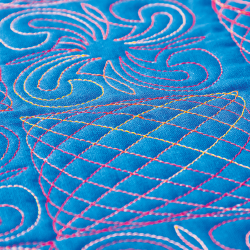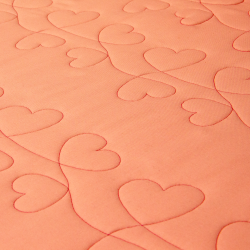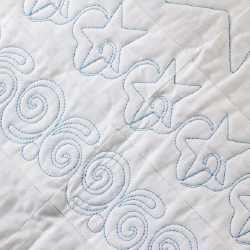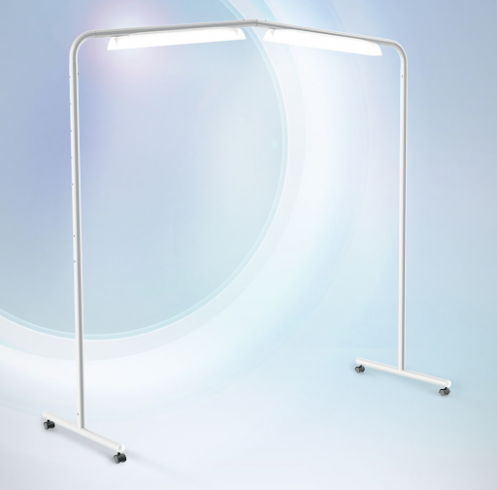How to Choose the Right Thread for Your Project
At face level, choosing the right thread for the quilting or sewing project you have planned is easy. Just pick the thread that will best complement the colors of your quilt top, your backing, your binding.
It turns out, there’s a little more to it than that.
Don’t panic! We’re here to help you navigate the considerations that go into picking the perfect thread for your project. Beyond aesthetic, there are two things you should keep in mind when choosing your thread: weight and material.
How to Choose the Right Thread Weight for Your Quilting Project
This measurement (often shortened to wt.) tells you how thick or thin the thread is. Interpreting thread weight feels a little counterintuitive, because the higher the thread weight number, the thinner the thread is.
 This is because thread weight is determined by dividing a length of thread by a set weight. More thread length is required to reach a set weight if a thread is thin, giving it a higher weight. Less thread length is required to reach the same weight if a thread is thick, therefore its weight is lower.
This is because thread weight is determined by dividing a length of thread by a set weight. More thread length is required to reach a set weight if a thread is thin, giving it a higher weight. Less thread length is required to reach the same weight if a thread is thick, therefore its weight is lower.
How to Choose the Right Thread Material for Your Quilting Project
This refers to the thread’s makeup. As a general rule, choosing a thread that has the same composition as the fabric you’re using in your project yields good results.
Still, there are pros and cons to every thread material, and we’ve done the legwork of weighing them for you to find the right thread for every kind of project.
Cotton
-
Made with natural fibers
-
More expensive than polyester thread of comparable quality
-
Blends into fabric well due to non-reflective matte finish
-
Zero-Stretch
-
Versatile (suited to almost any type of sewing)
-
Low-quality cotton thread produces a lot of lint and is prone to breaking
-
High heat tolerance
Polyester
-
Made with synthetic fibers
-
Less expensive than cotton thread of comparable quality
-
Extremely strong and durable
-
Reflective, waxy look
-
Some Stretch
-
Versatile (can be made to look and feel like other threads)
All-Purpose (Cotton-Poly Blend)
-
Polyester thread that’s been wrapped with cotton
-
Get the look of cotton thread with the strength of polyester
Silk
-
Most expensive choice
-
Smooth, lint-free fibers
-
Very fine
-
Can be molded into shape with the heat of an iron
-
Flexible and won’t leave holes
What Thread Should I Use to Piece a Quilt Top?
When you piece together the scraps of fabric that will eventually become your quilt top, your thread needs to be durable enough to withstand washing and the everyday wear and tear that comes from wrapping a quilt around your shoulders and snuggling up by the fire or spreading it out in the park as a picnic blanket.
The best thread weight for piecing
50 wt.
The best thread material for piecing
Cotton or Polyester
What Thread Should I Use to Bind a Quilt?
Binding holds together all three layers of your quilt sandwich, so the thread that holds it in place needs to be strong enough to keep the quilt top, batting, and backing together.
The best thread weight for binding
50 wt.
The best thread material for binding
Cotton or Polyester
What Thread Should I Use for Quilting on a Domestic Sewing Machine or Longarm? 
When it comes to quilting on either a home sewing machine or a longarm quilting machine, the thread weight determines how prominent or invisible your quilted designs will be, so there isn’t really a wrong answer. Think about if you want your piecing to take the most attention, or if you want to really show off your quilted patterns. If you want the piecing to stand out, choose a thinner, higher-weight thread. If you want the quilted designs to stand out, choose a thicker, lower-weight thread.
The best thread weight for machine quilting
Thin, high-weight fabric to emphasize your piecing
Thick, low-weight thread to emphasize your quilted designs (12 wt. maximum)
The best thread material for machine quilting
Polyester, cotton, or all-purpose (cotton-poly blend)
Grace Company's Finesse Thread is 50 wt., 100% polyester thread made for longarm and sewing machine quilting. If you don't want to give your thread any more thought, Finesse is a safe bet for all your quilting needs!
What Thread Should I Use for Hand Quilting?
Hand-quilting requires a much thicker thread than machine quilting to withstand the pressure you repeatedly put on it while tugging it through the fabric. It’s also important to use a no-stretch thread option to ensure that you’ve pulled each of your stitches as tightly as you intended.
The best thread weight for hand quilting
12 – 28 wt.
The best thread material for hand quilting
Cotton
What Thread Should I Use for Appliqué?
When appliquéing, most quilters want the fabric that they’re attaching to their project to shine, so the thread should take a back seat. For a more “invisible” thread, choose a matching color in a thin, high-weight.
The best thread weight for applique quilting
50 – 800 wt.
The best thread material for applique quilting
Cotton or Silk
 What Thread Should I Use When Sewing Clothing Items?
What Thread Should I Use When Sewing Clothing Items?
Matching your thread composition to your fabric composition is most important when it comes to garment sewing. And, of course, finding a thread color that closely matches your fabric color is essential. If you can bring your fabric with you when you buy your thread, we highly recommend it.
The best thread weight for sewing garments
Match your fabric! (All-purpose thread is another good option)
The best thread material for sewing garments
Match your fabric! (All-purpose thread is another good option)
What Thread Should I Use for Utility Sewing Projects?
Think sewing on buttons, straps, or other textile items that see a lot of pressure and use. Durability is key for these sewing projects. If your project is an outdoor item like a seat cushion or a canopy or hammock, be aware that there are threads specifically designed to withstand those conditions.
The best thread weight for utility quilting
Thick, Low-weight thread
The best thread material for utility quilting
Heavy Duty Polyester
Get the Best Quilting Thread for the Job… and Make!
When it comes down to it, this is just a guide. If you’ve found a thread that you love and it doesn’t fit into our boxes, that’s great! There really is no wrong way to quilt or sew or create, as long as you are enjoying the process and the way your project comes out.
Posted by The Grace Company
For over 25 years the Grace Company has been the leading manufacturer of high quality quilting frames and quilting accessories. What truly sets The Grace Company apart from other competitors is its level of quality, value, and experience toward all their endeavours. From products to external and internal customer experience, the Grace Company responds to market and customer needs and continues to lead the quilting industry. Grace Company frames and hoops are designed to be easy to build and compatible with most major quilting machines. They'll have the quilting product you need.



